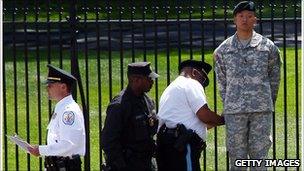Gates warns over abrupt halt to 'Don't ask, don't tell'
- Published

Iraq veterans including Lt Dan Choi were among those discharged under the policy
US Defence Secretary Robert Gates has warned a court-ordered halt of a ban on openly gay military personnel could have "enormous consequences".
A day after a judge halted the "Don't ask, don't tell" policy, Mr Gates said he preferred that Congress, not a court, settle the issue.
Under the policy, gay people can serve in the military but face expulsion if their sexuality is revealed.
A legislative bid to overturn the ban failed in the US Senate last month.
Policy 'to end'
"I feel strongly this is an action that needs to be taken by the Congress and that it is an action that requires careful preparation, and a lot of training," Mr Gates said. "It has enormous consequences for our troops."
Mr Gates' comments aboard a military aircraft came a day after US District Judge Virginia Phillips, in California, issued a permanent injunction forbidding the US military from enforcing the 17-year-old ban.
At the White House on Wednesday, spokesman Robert Gibbs described "don't ask, don't tell" as "a policy that is going to end". But he declined to answer whether the Obama administration preferred to seek a stay of the injunction and appeal against the ruling.
The US Department of Justice has 60 days to appeal but may opt not to do so.
President Barack Obama has said repeatedly he favours scrapping the ban, and Mr Gibbs reiterated the administration would prefer it be done in Congress rather than the court system.
The US House has already passed a repeal, but the bill stalled in the Senate last month amid staunch Republican opposition. Republicans are poised to make gains in both chambers in the upcoming mid-term election.
"The political balance of power is going to shift after these elections," said Richard Socarides, former gay and lesbian policy adviser to President Bill Clinton. "It's only going to get harder."
Gays warned
Meanwhile, the Pentagon has been studying how gay people can be integrated into the US military and is to report on its findings on 1 December.
Pentagon officials have said allowing openly gay military personnel would necessitate dramatic policy changes on everything from housing and insurance to protocol at social events.
Pending the uncertainty, a prominent legal organisation warned gays in the military not to reveal their sexual orientation yet.
"Service members must proceed safely and should not come out at this time," Aaron Tax, legal director for the Servicemembers Legal Defense Network said.
Britain, Israel and dozens of other countries allow gay personnel to serve openly, but under the US policy established in 1993, gays may serve in the military but cannot acknowledge their orientation. The military is forbidden to inquire but may expel service members found to be gay.
The lawsuit that led to the world-wide injunction against the ban was brought by the Log Cabin Republicans, a pro-gay Republican group, on behalf of openly gay military personnel who had been discharged.
Supporters of the ban say allowing gay people to serve openly in the US military would lower troop morale and hinder military readiness.
Judge Phillips declared the policy unconstitutional after a brief trial last month. She found it violated gay military members' rights to free speech and to equal protection under the law.
Government lawyers objected to an immediate, nationwide injunction, arguing it might harm military operations during wartime.
- Published25 September 2010
- Published21 September 2010
- Published21 September 2010
- Published10 September 2010